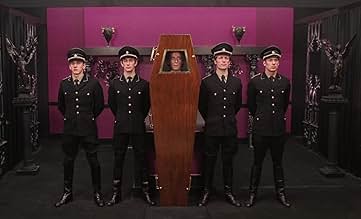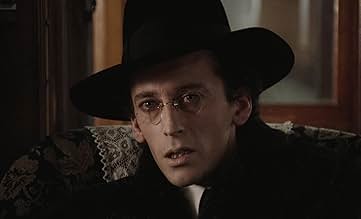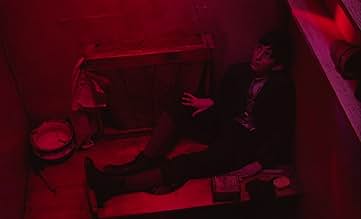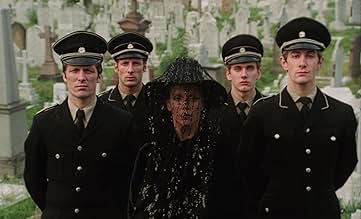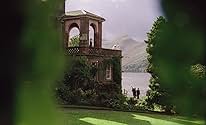Mahler
- 1974
- Tous publics
- 1h 55min
NOTE IMDb
7,0/10
3,3 k
MA NOTE
La vie du compositeur Gustav Mahler, racontée dans une série de flashbacks alors que lui et sa femme discutent de leur mariage raté lors d'un voyage en train.La vie du compositeur Gustav Mahler, racontée dans une série de flashbacks alors que lui et sa femme discutent de leur mariage raté lors d'un voyage en train.La vie du compositeur Gustav Mahler, racontée dans une série de flashbacks alors que lui et sa femme discutent de leur mariage raté lors d'un voyage en train.
- Victoire aux 1 BAFTA Award
- 3 victoires et 1 nomination au total
Avis à la une
Ken Russell's composer biographies hit their apex with his stylized take on Tchaikovsky in "The Music Lovers." Three years later, Russell began his descent with "Mahler." Structured as a series of flashbacks, it may be hard to follow for anyone unfamiliar with the events and chronology of Mahler's life. The conversion sequence sets a new standard for poor taste, even for Russell. Robert Powell gives a fine performance, aided by a close resemblance to the real deal. Georgina Hale failed to make an impression in her appearance in Russell's "The Boy Friend," and is tentative, at best, here in a leading role as wife Alma. Antonia Ellis, another alumna of "The Boy Friend" is game for anything Russell throws at her. Even with a taste for the Russell treatment, "Mahler" may be a little hard to swallow.
Mahler is an interesting case. Whereas Ken Russell's films are either just over the top (his theatrical films), or maybe even too subtle (his television work), Mahler is both. Its closest companion may be always the simple but exquisite Song of Summer, but there is that usual kitsch and excess you can find without a magnifier from Lisztomania and other Russell classics.
What I'm trying to say is that if you find Russell's television work too tame, and The Devils and Tommy are just too much, Mahler might be your film. It's not Russell's best, but in this film he found a balance which is rare to him. It may be a slow and long film, but in the end game is wonderfully rich and profound in explaining the essence of artistry and creativity. And much like Michael Powell did to ballet dance in The Red Shoes, Russell doesn't just explain his subject matter in Mahler: he brings it alive. It's like the romantic Gustav Mahler himself made this film.
And, of course, there is the music! Much recommended to everybody.
What I'm trying to say is that if you find Russell's television work too tame, and The Devils and Tommy are just too much, Mahler might be your film. It's not Russell's best, but in this film he found a balance which is rare to him. It may be a slow and long film, but in the end game is wonderfully rich and profound in explaining the essence of artistry and creativity. And much like Michael Powell did to ballet dance in The Red Shoes, Russell doesn't just explain his subject matter in Mahler: he brings it alive. It's like the romantic Gustav Mahler himself made this film.
And, of course, there is the music! Much recommended to everybody.
Mahler has sometimes been cited as the finest of Russell's composer bio-pics, an informal series which began with several impressive works made for television at the beginning of the 1960s. As such it falls between the relative restraint of the black-and-white photographed Gordon Jacob (1959) and the uninspired late Mystery Of Dr Martinu (1993), another TV special that more or less finished the run. Elgar: Fantasy Of A Composer On A Bicycle (2002), a revisiting of Russell's celebrated early work (Elgar), seemed like a creative codicil. Like The Music Lovers (1970), which preceded it, and Lisztomania (1975), which followed, Mahler was made for the big screen. The larger budgets involved allowed Russell the narrative luxuries of greater length and a move to colour; but also to indulge a penchant for flamboyant fantasy, kitsch and nudity.
The film takes place mostly as a series of flashbacks, experienced by the ailing composer as he travels to take up a last appointment in Vienna, accompanied by his wife Alma (Georgina Hale). Portraying the composer is Robert Powell who, showing a close resemblance to the subject, arguably does a far more sympathetic job than Richard Chamberlain (Russell's Tchaikovsky) or Roger Daltrey (Liszt). His memories prompted by his imminent mortality, as well as Alma's libidinous interest in a handsome soldier also on the train, Mahler dwells on several key episodes of his life, such as his early musical education, his conversion to Catholicism and a humiliating job interview for the Vienna Opera. Thus while the fatigue wracked composer's train journey is experienced as reality, his feverish recollection of a creative past is often hallucinatory and surreal - moments at which Russell's colourful staging of events is foremost.
Just how one takes the resultant mix of high culture and low camp is a matter of personal taste. "Why is everyone so literal these days?" complains Russell's disillusioned composer at one point. It is worth bearing this view in mind, as well as Mahler's later opinion that it is sometimes necessary to "see with the eyes of children... and hear with the ears of children." Literal or not, Mahler is definitely not for children, including as it does Nazis, naked cavorting, and some cod nightmare imagery in one characteristically overheated package. For this viewer, seeing the film again for the first time since the original release, the result is the same: I was entertained, if ultimately unmoved, by a work which may show the audience the way Russell sees his Mahler - but is far less convincing as to how *Mahler* saw his world. At the end of the day Russell's more extravagant stagings become a distraction rather than a revelation, the composer's creative neuroses coarsened by the director's very personal, baroque vision.
This 'problem' with Mahler is the same as with several of Russell's more ambitious films. The director's heavy handed use of not-especially-shocking imagery - in fact one doubts now whether, in most cases, it ever really was very alarming, more just in bad taste - usually done quickly and on a budget, drives home matters with a sledgehammer. On those occasions where Russell's approach has proved most successful, such as in The Devils (1971), disturbing imagery coincides most closely with the subject (religious hysteria and the inquisition) a reinforcement that benefits further from first-rate art direction (by Derek Jarman). In Mahler, to take a glaring example, the intrusion of black-uniformed Nazis into the composer's nightmare of premature burial - a sequence that culminates in a semi-nude Alma squatting over his death mask, is both crass and irrelevant. Similar doubts attend the conversion to Catholicism film within a film, featuring some laboured silent comedy - Powell as Mahler even does a Stan Laurel 'cry' at one point - including setups which perhaps inspired Tim the Enchanter's appearance in Monty Python And The Holy Grail, in cinemas a year later. The parodic intrusion of the Third Reich into a film about a composer might have made sense if the subject had been the notably anti-Semitic and pompous Wagner. Supporting an account of the insecure, frequently humiliated, Jewish, Mahler, its heavy handed and inappropriate nature is ultimately toe curling.
Fortunately, and even with all these shortcomings, Russell's film is rarely boring. Buoyed up with of large chunks of music, Mahler's sequence of colourful events moves along easily enough. Shot mostly on location in Russell's beloved Lake District, a lot of the film makes a fair pass of recreating Austria in the first decade of the last century. The most affecting moments for this viewer remain the quieter ones - Mahler alone in his summer house, conducting one of his great orchestral canvases in his head, or the quiet interlude with the doctor who confesses to being tone deaf and, ironically, is someone the composer feels he can trust most easily. Russell's recreation of Mahler's childhood is also interesting, as the young composer meets a puckish man in the woods (Ronald Pickup) who offers his timely advice that "The man who doesn't live in nature can't write a true note of music." This sequence is one of the few times that performances are allowed to grow for, squeezed between Russell's set pieces and Mahler's mammoth orchestrations, actors sometimes appear hard pressed to make an impression with quieter moments of dialogue. Perhaps Powell and Hale come off best as a couple towards the end of the film, as the composer delicately explains her role in his inspiration. It's a sensitive moment, bringing a note of intimacy often lacking elsewhere. In short this is a Mahler which is deeply flawed, if rarely dull, which at least is to Russell's credit and persistence as a maverick film maker.
The film takes place mostly as a series of flashbacks, experienced by the ailing composer as he travels to take up a last appointment in Vienna, accompanied by his wife Alma (Georgina Hale). Portraying the composer is Robert Powell who, showing a close resemblance to the subject, arguably does a far more sympathetic job than Richard Chamberlain (Russell's Tchaikovsky) or Roger Daltrey (Liszt). His memories prompted by his imminent mortality, as well as Alma's libidinous interest in a handsome soldier also on the train, Mahler dwells on several key episodes of his life, such as his early musical education, his conversion to Catholicism and a humiliating job interview for the Vienna Opera. Thus while the fatigue wracked composer's train journey is experienced as reality, his feverish recollection of a creative past is often hallucinatory and surreal - moments at which Russell's colourful staging of events is foremost.
Just how one takes the resultant mix of high culture and low camp is a matter of personal taste. "Why is everyone so literal these days?" complains Russell's disillusioned composer at one point. It is worth bearing this view in mind, as well as Mahler's later opinion that it is sometimes necessary to "see with the eyes of children... and hear with the ears of children." Literal or not, Mahler is definitely not for children, including as it does Nazis, naked cavorting, and some cod nightmare imagery in one characteristically overheated package. For this viewer, seeing the film again for the first time since the original release, the result is the same: I was entertained, if ultimately unmoved, by a work which may show the audience the way Russell sees his Mahler - but is far less convincing as to how *Mahler* saw his world. At the end of the day Russell's more extravagant stagings become a distraction rather than a revelation, the composer's creative neuroses coarsened by the director's very personal, baroque vision.
This 'problem' with Mahler is the same as with several of Russell's more ambitious films. The director's heavy handed use of not-especially-shocking imagery - in fact one doubts now whether, in most cases, it ever really was very alarming, more just in bad taste - usually done quickly and on a budget, drives home matters with a sledgehammer. On those occasions where Russell's approach has proved most successful, such as in The Devils (1971), disturbing imagery coincides most closely with the subject (religious hysteria and the inquisition) a reinforcement that benefits further from first-rate art direction (by Derek Jarman). In Mahler, to take a glaring example, the intrusion of black-uniformed Nazis into the composer's nightmare of premature burial - a sequence that culminates in a semi-nude Alma squatting over his death mask, is both crass and irrelevant. Similar doubts attend the conversion to Catholicism film within a film, featuring some laboured silent comedy - Powell as Mahler even does a Stan Laurel 'cry' at one point - including setups which perhaps inspired Tim the Enchanter's appearance in Monty Python And The Holy Grail, in cinemas a year later. The parodic intrusion of the Third Reich into a film about a composer might have made sense if the subject had been the notably anti-Semitic and pompous Wagner. Supporting an account of the insecure, frequently humiliated, Jewish, Mahler, its heavy handed and inappropriate nature is ultimately toe curling.
Fortunately, and even with all these shortcomings, Russell's film is rarely boring. Buoyed up with of large chunks of music, Mahler's sequence of colourful events moves along easily enough. Shot mostly on location in Russell's beloved Lake District, a lot of the film makes a fair pass of recreating Austria in the first decade of the last century. The most affecting moments for this viewer remain the quieter ones - Mahler alone in his summer house, conducting one of his great orchestral canvases in his head, or the quiet interlude with the doctor who confesses to being tone deaf and, ironically, is someone the composer feels he can trust most easily. Russell's recreation of Mahler's childhood is also interesting, as the young composer meets a puckish man in the woods (Ronald Pickup) who offers his timely advice that "The man who doesn't live in nature can't write a true note of music." This sequence is one of the few times that performances are allowed to grow for, squeezed between Russell's set pieces and Mahler's mammoth orchestrations, actors sometimes appear hard pressed to make an impression with quieter moments of dialogue. Perhaps Powell and Hale come off best as a couple towards the end of the film, as the composer delicately explains her role in his inspiration. It's a sensitive moment, bringing a note of intimacy often lacking elsewhere. In short this is a Mahler which is deeply flawed, if rarely dull, which at least is to Russell's credit and persistence as a maverick film maker.
If you are in the camp of liking Ken Russell, you are going to love this movie. If you like Mahler's compositions and think you're going to get a straightforward biopic (more on this later), you're in the wrong place.
This film is beautifully shot, the acting is over the top in many cases, the imagery will at times be disturbing, the metaphors will run deep, like all Russell's movies.
I just heard of Georgina Hale's passing in January of this year (2024) so was drawn to watch this film again because she was fantastic. I know she won a BAFTA for it, but she should have been given more recognition outside of the UK for this role.
I want to return to the term "straightforward biopic" now. By that I mean the cookie cutter, sanitized tripe that moviegoers normally eat up like Bohemian Rhapsody, Rocket Man, A Beautiful Mind, etc., that take real people who had very interesting lives and then manipulate, fabricate, and distort to give us our feels but no substance. You're better off just watching a documentary in most cases.
If you're going to do a biopic, I say go all in like Ken Russell does. While you may get his version of the story, at least you're going to be in for a beautiful and wild ride that will also make you think.
This film is beautifully shot, the acting is over the top in many cases, the imagery will at times be disturbing, the metaphors will run deep, like all Russell's movies.
I just heard of Georgina Hale's passing in January of this year (2024) so was drawn to watch this film again because she was fantastic. I know she won a BAFTA for it, but she should have been given more recognition outside of the UK for this role.
I want to return to the term "straightforward biopic" now. By that I mean the cookie cutter, sanitized tripe that moviegoers normally eat up like Bohemian Rhapsody, Rocket Man, A Beautiful Mind, etc., that take real people who had very interesting lives and then manipulate, fabricate, and distort to give us our feels but no substance. You're better off just watching a documentary in most cases.
If you're going to do a biopic, I say go all in like Ken Russell does. While you may get his version of the story, at least you're going to be in for a beautiful and wild ride that will also make you think.
This movie, while beautifully shot, grows completely out of control as is moves along. The once over of Gustav Mahler by Ken Russell falls into the trap that all the other Russell films do--over excess. The shot of Mahler biting into a pig snout is one of the most disgusting and offensive images I have ever seen.
Le saviez-vous
- AnecdotesKen Russell was inspired to make his film about composer Gustav Mahler after greatly disliking Mort à Venise (1971). In a segment of his autobiography about this film, Russell said that he thought that the other "so-called Mahler film," "Death in Venice," was rubbish. "People think it's about Mahler, all because his music is part of the soundtrack! The director, Luchino Visconti, never said it was about him, though." So he mocked the film in his movie. He had a satirical moment when Mahler looks out of the train and sees his dying lookalike. In Visconti's movie, the young actor playing Tadzio was 15, but in this film, as in Thomas Mann's book, the boy being ogled is only a child.
- GaffesWhen Mahler's train leaves St. Pölten, a sign is visible identifying the town as "Saint Pölten". Yet, the German long script for the town is "Sankt Pölten".
- Citations
[last lines]
Gustav Mahler: [reminded of some medications he should take] They won't be needed! We're going to live forever!
- ConnexionsFeatured in A British Picture (1989)
- Bandes originalesIn Stormy Weather
Sung by Carol Mudie
Performed by The National Philharmonia Orchestra
Conducted by John Forsyth
Meilleurs choix
Connectez-vous pour évaluer et suivre la liste de favoris afin de recevoir des recommandations personnalisées
- How long is Mahler?Alimenté par Alexa
Détails
- Date de sortie
- Pays d’origine
- Langues
- Aussi connu sous le nom de
- Mahler, una sombra en el pasado
- Lieux de tournage
- Sociétés de production
- Voir plus de crédits d'entreprise sur IMDbPro
Contribuer à cette page
Suggérer une modification ou ajouter du contenu manquant


